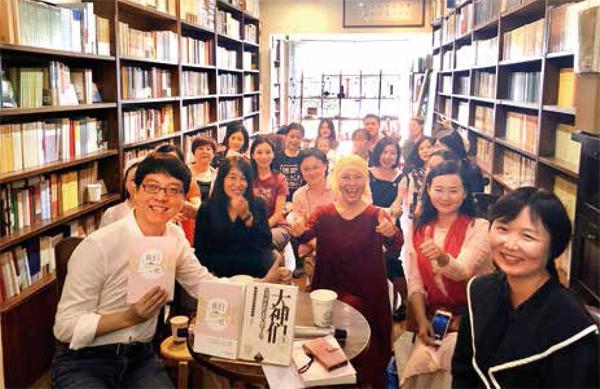中年“怂”,其实是一种和解
2018-11-12陈曼冬
陈曼冬
读新书《我们复婚吧》有感——
今年下半年,关于“中国式压力”的讨论一度登上了网络热搜。尤其是演员姚晨在节目《星空演讲》中诉说当下的中年尴尬,“兼顾事业与家庭,失败是常态,成功是偶发”引发声援与吐槽齐飞。
在这样的背景下,一本新书《我们复婚吧》悄然登上书架,作者名叫徐澜。作为记者、作家、出版人、妻子、母亲,徐澜的多重身份,让她游刃有余地用文字“高仿现实”,直击内心。
徐澜也是笔者杭州二中的师姐。读书的时候,她是榜样,以及传说中的“别人家的孩子”。然而,我们却是在人到中年后才第一次见面。后来,间或在微信上互动,不算频繁,基本上都是点到即止。再后来,她说要寄一本她的新书《我们复婚吧》。书到手,拆开,是温柔的粉。封面上是两枚交叠的戒指。
这几年,开始无法遏制地喜欢起年轻时候从未入过眼的粉红色,后来笔者才知道这便是典型的“中年少女”的症状。这粉色的封面,便如同一把温柔的利器,有着来历不明的力量,一下下抓挠,爽利,以至于轻微的疼痛。这种猝不及防的点穴般的真实感,让每一个打开这本书的人,不由自主地对号入座。
中国社科院公布过这样一组数据:2017年上半年,全国有558万对新婚夫妇,同时有185万对离婚;与前一年相比,离婚率同比增长10.3%,而结婚率同比下降7.5%。越来越多的女性选择不婚,也有越来越多的女性结了又离。前几天,也刚流行过一句话——“离婚的最根本原因是因为结婚”。
离婚也好,复婚也罢,都不过是人生的一种状态,没有哪一种状态要优于另外一种。当婚姻不开心,承载不了自己的期望时,很多人就会选择离开。在婚姻围城里的中年女性,偶尔能过上“伪单身”的日子,便是乐颠颠地在心里叫嚣“老娘如果离婚了肯定过得活色生香”。所以,乍一看到这题目便认为是与现实高度冲突的小说,在心里翻了个白眼说,“傻瓜才复婚”。在收拾国庆小长假旅行行李的时候,笔者却还是鬼使神差地放进了这本书。而接下来的日子,便是对这本书的欲罢不能。
这是徐澜出的“时间与爱”系列三部曲的第二部。故事的主人公刘乐乐、杨建兵、顾涛、吕洁、徐宝根……从上世纪90年代大学校园走来,十多年职场拼搏、出国奋斗,凸显了置于亲情中的人伦关系与情爱过程。故事里有时间推进的光影,有年代转换的喧哗场景,也有故事中人物随风变幻的心绪。不同的性格、婚姻、人生轨迹,故事勾勒出大时代背景下小人物20年变迁的命运,从家庭视角出发,记录时间的回声、人性的煎熬,凸显人伦关系与情爱过程。而其中唯一不变的,是变化。
笔者与书中的主人公有着相仿的年纪,都是上世纪90年代进入大学的一代。对于这20年时代的变迁以及内心的成长,却有着“不识庐山真面目,只缘身在此山中”的迷茫。而这本书,恰好让我们这一代人可以跳脱出来,尽量清晰地看到自己和这个时代。从这个角度来讲,这本书是一面镜子。
透过吕洁,透过刘乐乐,看到的是我们自己,从一个女孩到一个成熟女性将近20年的成长,看到生活如何曲折心酸,看到生活如何不易,对情感的认知一天比一天深刻。这大约是一种共情。而书中的共情渗透在字里行间、角角落落。小到一道菜的名称、一个宾馆的老式叫法,比方说延龄饭店;大到某一个时代发生的真实事件,比方说中国资本市场那一场最惨烈的股灾,比方说至今让人不愿意相信的马航空难。徐澜把虚构作品写得如同真实发生的故事,让阅读者在虚虚实实的空间里进进退退。而究竟是进退自如,还是以进为退或者以退为进,那么便是每个阅读者的自我观照了。
作为女性读者,一直以来的阅读偏好是爱情小说,自我写作在很长一段时间内也跳脱不出小女人的情怀。随着年龄增长,这些年开始不喜欢自己的小女人情怀,而调整起来却也很难。这本书,却脱离了小女人的小趣味,写出了大时代的酸甜况味。
“我们复婚吧”,粗听似乎是一个带有强烈理想主义色彩的呼喊,而细细琢磨,却是实在到不能再实在的一句话,是对现实生活的妥协。
想起徐澜寄书的一个小细节——
收到书,并没有如大多数人一般带有签名。于是笔者便微信她:“师姐,下次见你要讨个签名。”她回得很快:“我有负担的,还是看完送人,或者一扔。”
事实上,《我们复婚吧》整个的基调,就如同这个寄书的小细节。“经历得越多,越能认识到作为个体的渺小,从而尊重规则,敬畏他人。”这是徐澜发来的一条微信,她把这种状态称之为“怂”。她讲,“怂”对于她是褒义词。对于这本书的诠释,徐瀾用得比较多的一个词就是“怂”。把“怂”字拆分,看到的是“从心”。遵从的,便是时间过滤后留下的一颗与世无争又无所畏惧的心罢。
一直以来,笔者对写长篇的作家都极为佩服,尤其徐澜这样非专业作家的媒体人、出版人。一部长篇,基本上是体力活儿。在她的书里有这样一段话:“写作本身就是一种反抗,它不能改变世界,但也许可以改变读它的人。我希望给别人留一条后路……”
“梦想似乎就在前方,我们奋力向前划,如同逆水行舟,不停地被浪潮推回到往昔岁月。”这是菲茨杰拉德的《了不起的盖茨比》结尾的一段话,徐澜姐把它用在了小说的尾声,将小说的开放式结尾烘托得刚刚好,也将人到中年的况味发酵蒸腾。
Reconciliation through Restored Marriage
By Chen Mandong
In September 2018 I received from Xu Lan a copy of her latest novel titled Lets Remarry. The novel caught my fascination not because the novelist, a few years senior, and I are from the same middle school, but also because life, marriage, love, etc, are hot topics that have caught my concerns in recent years. Just the other day, Yao Chen, a film and television celebrity, talked about her understanding of mid-age life in a television program. She talked about the mid-age crisis, commenting that “taking care of family and career at the same time is an arduous challenge. Failure is a normalcy and success is rare and accidental.”
I did not meet Xu Lan until we were both middle-age persons. We have chatted on social media infrequently. I know she is busy: her identity bespeaks the challenges she faces: she is a journalist, novelist, publisher, wife, and mother, among other roles she plays in her life.
I had no idea why I put novel into the suitcase when I packed for the golden-week holiday in early October. But I did read it during the holiday to see how it addresses social realities. It is known that many middle-aged women get divorced and their attitude toward their failed marriage is something one hears now and then. I devoured the novel.
The novel is the second of a trilogy titled Time and Love. The characters of the novel are the authors contemporaries: they graduated from college in the 1990s and some have worked as white-collar workers and some went abroad to try their luck. Personalities, marriages, life stories are set in the society where great changes have been taking place.
I devoured the novel because I got a new perspective to look at myself through reading about these characters in the same age bracket. I am one of them. The novel gave me an opportunity to examine myself and people and things around me. The well-known social events and familiar details in everyday life come together to weave the foreground and background of the fiction: the stock market catastrophe that wreaked havoc across the world, the plane crash and disappearance, the names and places that are no more. The fiction reads like something real. Whether the reader has the final say on which is fictitious and which is real is open to discussion.
“Lets restore our broken marriage” sounds like willful and idealistic, but it is a pragmatic call for reconciliation with reality and life.
The other day I chatted with Xu Lan on social media and asked if she could sign the copy she gave me. She declined in her quick response: “Signing my name makes me uncomfortable. You can give it away after you read it or just throw it away.”
The undertone of the novel, it seems, is like the details. “The more we know about life, the more we understand individuals and the more we respect rules and care for other people,” said Xu Lan in a WeChat message to me. She describes her attitude as “慫”, a Chinese word that refers to ones resignation and surrender. But in Chinese, the word is composed of two parts: follow the heart. In Xus opinion, the word carries a positive significance: You follow your heart and assume an attitude not to fight a meaningless fight but lead a fearless life.
“Writing a novel is a kind of resistance. It cant change the world, but I hope it may make some change in a reader. I hope my novels present a way out,” commented Xu Lan.
